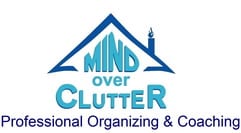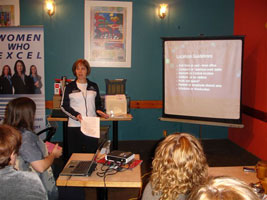Coopetition
Do You Play Well with Others? A look at cooperative competition
Coopetition occurs when companies work together for parts of their business where they do not believe they have competitive advantage and where they believe they can share common costs. (Source: Wikipedia)
In my experience, most professional organizers are very happy to share resources and expertise with their colleagues and reap many rewards from doing so. I asked my client, Julie Stobbe, about her thoughts on the subject, and was so impressed that I invited her to share them here today as my guest blogger.
Cooperating with someone in your line of business is a great way to get to know people, brainstorm, learn ideas and help each other with areas that you are weak in.
How to get started
When I decided to try coopetition, I did it on a project basis. I used it to help me be better at marketing because marketing is not my strength.
I would think about something I would like to have (product development) or something I would like to do (offer a new service) and think about someone who had mentioned that they had an interest in the same thing. I would approach them with an idea and see if they were interested in working together to develop and implement the plan. It was nice to have a partner to walk the path with and hold my hand.
The payoff is having to do half the work while increasing business for both parties with the understanding that if they get busy and need help, they would approach me first, and I would do the same for them. If you develop a service with a partner, if someone gets sick, you have the other person as backup. I always selected someone who lived east of my main marketing area. This made it easy to get materials delivered over a larger area – half the work, twice the area covered. This gave us both exposure to a larger market.
Coopetition opportunities
Here are some examples of projects I’ve worked on with people in my field and with complementary businesses:
- Developing organizing tip booklets; we have 4 different topics.
- Developing in-person courses to offer to colleges, school boards and groups; we have 3 different 3 hour courses prepared.
- Advertising someone else’s electronic resources (because I don’t want to develop them at this time) in exchange for services.
- Advertising together so the cost of marketing is shared by both companies.
- Recommending specialty services to clients, such as clutter removal services, rug cleaning, and website design.
- Developing online courses for associations that provide training. I have the content and knowledge in my field of expertise and the association can reach new markets for my courses.
- Inviting someone to attend new meetings and events with me. That way I don’t have to walk in alone, and perhaps they can make introductions too.
- Establishing a group that meets virtually to share information from across the country and around the world. It is a wonderful way to learn new strategies and make new referral partners.
Pitfalls
Although I have been fortunate and careful with whom I partner, there are always things to consider.
- The person you partner with now represents your company as well as their own. Make sure you have similar business ethics or your company’s reputation may be adversely affected.
- If you are producing a product and the quality of what they produce is not up to your standards, you may be disappointed. However, you have both contributed time and money to the project so they may use it the way they want to.
- One of the companies may work much harder at marketing the product or service than the other company. Make sure that you can live with it if you realize that you are marketing them but they are not marketing you.
In my experience
Overall, I have gained a lot from coopetition with others. I have grown as a business person, I have learned new skills, I have made good friends I can depend on, and I have learned to be flexible. I hope my coopetition partners have found me to be reasonable, supportive and hard working. Taking a chance to work with good people is really making a sure bet.
Thanks to Janet Barclay of Organized Assistant for interviewing me.
 Julie Stobbe is a Trained Professional Organizer and Lifestyle Organizing Coach who brings happiness to homes and organization to offices, coaching you virtually using Zoom. She has been working with clients since 2006 to provide customized organizing solutions to suit their individual needs and situations. She uses her love of teaching to reduce clutter, in your home, office, mind and time. She guides and supports you to be accountable for your time, to complete projects and to reach your goals. If you’re in a difficult transition Julie can coach you to break-free of emotional clutter constraining you from living life on your terms. Online courses are available to help instruct, coach and support your organizing projects. Get started by downloading Tips for Reorganizing 9 Rooms.
Julie Stobbe is a Trained Professional Organizer and Lifestyle Organizing Coach who brings happiness to homes and organization to offices, coaching you virtually using Zoom. She has been working with clients since 2006 to provide customized organizing solutions to suit their individual needs and situations. She uses her love of teaching to reduce clutter, in your home, office, mind and time. She guides and supports you to be accountable for your time, to complete projects and to reach your goals. If you’re in a difficult transition Julie can coach you to break-free of emotional clutter constraining you from living life on your terms. Online courses are available to help instruct, coach and support your organizing projects. Get started by downloading Tips for Reorganizing 9 Rooms.
Contact her at julie@mindoverclutter.ca





